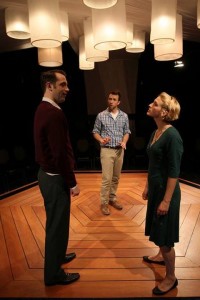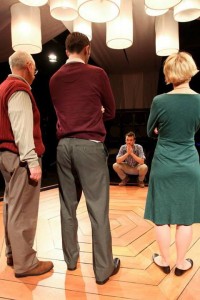Here’s the setup: A young man has lived with his male lover for a few years. During a spat he falls for a woman. Things have gotten complicated and he can’t decide what to do.

COCK is designed to be performed in the round. Colin McIlvaine’s handsome wood stage platform at Studio X features built-in lighting all around the edges. As playwright Mike Bartlett focuses on emotional interaction, not only is the stage stripped bare, so are the characters’ thought processes and machinations. Director Deborah Block has done a masterful job illuminating the text—it’s all focus and precise attention, characters’ close readings of each other, dissecting words and attitudes. The actors’ economical movements from one stage position to another reveal that one of the director’s roles has been to supply spatial choreography that reveals isolation, influence, and alliances.
The playwright has carved out his specific territory and he sticks to it. No frills. No extras. Totally missing are incidental stage business, furniture, and normal interaction with common objects: Actors drink wine with no wine glasses and no mimed drinking motions. They sit on no chairs. Pretty much no one does anything ordinary. In your mind you can fill in the blanks with any commonplace action that’s described.
There’s unseen nudity and an unseen explicit sexual act, performed by fully clothed actors standing at a distance, talking to each other. It’s awkward and oddly hot, and funny. Christopher Colucci’s incidental sounds and snatches of original music lie behind the seduction scene, commenting on it.
The success of COCK relies on a magnetic lead character, John (Wes Haskell), the object of affection. Kind of rumpled and self-serving, John lives for the moment and lies like a rug, telling his partners whatever’s most convenient from his perspective. But as he has no fixed perspective, this is part of his dilemma. Who is he? What does he want? And a question that this play doesn’t answer: What does he offer? And what makes him so desirable to the man and the woman?
Tight, engaged acting hits just the right notes. John Jarboe presents elegantly as John’s long-time lover, M, who’s witty, piercing, conventional, and sure about his identity and his love. And although M becomes distraught, he’s still more pulled together than John. Mary Tuomanen, an acting instrument, is W, the woman in John’s life. It’s a pleasure to watch the absolutely clean lines of her performance as a disarming and scarcely veiled aggressive force.

Both of his loves have agendas for John, and there’s an uncomfortable dinner at which they are to straighten things out. F (Ben Lovell) a surprise dinner guest, is invited by his son, M, to back him up. Lovell does a good job supplying F’s well-intentioned views, those of an older generation liberal who cares but doesn’t quite get it. His advice is quickly turned on end by John, who craves a more particularized philosophy as he dodges decisions.
People change subtly all the time, partly depending on the company they’re with. They are the self they’ve learned in the presence of the other. “Know thyself ” is easier said than done. When the self is such a shifting thing, general categories may not fit. John wants to shed blanket sexual identity labels that specify what he is, in favor of a mutability that comes from who he is and whom he loves. He wants his own rules of engagement to emerge from his confusion and the fluid nature of identity. Inside his head, like a particle/wave duality, he’s drawn simultaneously to two different states.
Producing artistic director Deborah Block comments on the Philadelphia premiere,” We were drawn to COCK because it fits into Exile’s mission of exploring the human condition, which often isn’t neat and pretty.” The risk-taking specialists at Exile have again scored a palpable hit with a well-selected, well produced, and singular show. October 17-November 10, 2013; theatreexile.org.

One Reply to “COCK (Theatre Exile): Spatial choreography reveals isolation, influence, and alliances.”